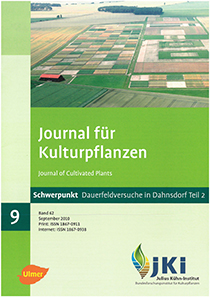Investigations of the economic efficiency of insecticide use in oil-seed rape in a long-term trail in Dahnsdorf
DOI:
https://doi.org/10.5073/JfK.2010.09.02Keywords:
Winter oil-seed rape, Psylliodes chrysocephala, Ceuthorrynchus napi, Ceuthorrynchus quadridens, Meligethes aeneus, Ceuthorrynchus assimilisAbstract
Because conditions can vary strongly from year to year, long-term trials are very important to obtain reliable data on the effects of insecticide treatments of oil-seed rape insect pests. The long-term trial entitled “Strategy comparison – environmentally friendly plant protection” was conducted at the Julius Kühn-Institute’s experimental station in Dahnsdorf, Germany, and used to study the efficiency and profitability of insecticide uses in oil-seed rape from 1998 to 2007.
Rape flea beetles (Psylliodes chrysocephala) and stem weevils (Ceuthorrynchus napi, C. quadridens) were monitored using grateless yellow traps, and the pollen beetles (Meligethes aeneus) and cabbage seed weevils (Ceuthorrynchus assimilis) were assessed by counting beetles after shaking oil-seed rape buds.
In all ten years studied, insecticide treatments were carried out only when insect numbers exceeded specific action thresholds. Stem weevils had to be controlled in nine out of ten years, and pollen beetles in four out of ten years. Overall, situation-dependent insecticide uses according to the principles of integrated pest management (mean treatment frequency index: 1.5) resulted in a mean net profit of 72 €/ha, whereas the low input strategy (reduced insecticide use, mean treatment index: 0.6) reduced the net profit to 22 €/ha.
The 10-year results showed that selective and consistent use of insecticides in oil-seed rape according to an action threshold strategy is economically efficient. However, there is little economic scope for situation-dependent doses reduction.
Downloads
Published
Issue
Section
License
The content of the journal is licensed under the Creative Commons Attribution 4.0 License. Any user is free to share and adapt (remix, transform, build upon) the content as long as the original publication is attributed (authors, title, year, journal, issue, pages).
The copyright of the published work remains with the authors. The authors grant the Journal of Cultivated Plants, the Julius Kühn-Institut and the OpenAgrar repository the non-exclusive right to distribute and exploit the work.







